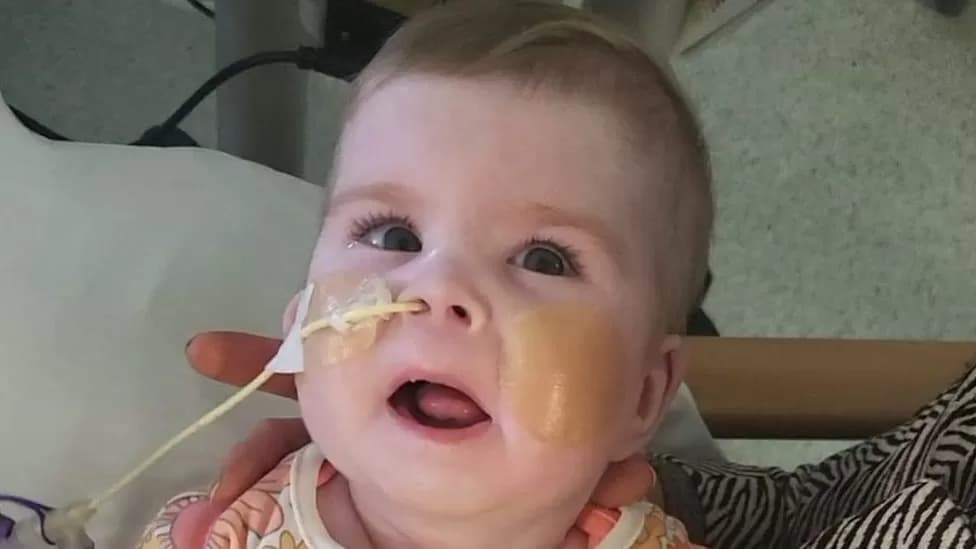LEICESTER, United Kingdom – A British judge ruled Wednesday that a baby girl with a rare disease may not be transferred from the UK to Italy for treatment, despite a fast-track decision by the Italian government to grant her citizenship and to name the general director of the papally-sponsored Bambino Gesù pediatric hospital as her guardian.
Based on the ruling, life support should be withdrawn from eight-month-old Indi Gregory today. The judge also turned down a request from the baby’s parents that they be allowed to take her home for end-of-life care.
Gregory has a rare mitochondrial disease regarded by her British medical team as fatal and irreversible, but her parents have maintained that despite her disability, she is a happy baby who responds to their touch. The Queen’s Medical Centre in Nottingham, which was treating her, argued her life support should end.
RELATED: European court rejects appeal to stop hospital death of baby girl
After her transfer was denied, Italian Prime Minister Giorgia Meloni vowed to “defend” the girl, and had Italy’s government grant her citizenship.
“My heart fills up with joy that the Italians have given Claire and I hope and faith back in humanity. The Italians have shown us care and loving support, and I wish the UK authorities were the same,” said Dean Gregory, Indi’s father, after that decision.
“I’m very proud to say Indi has Italian citizenship and I thank the Italian government and the Italian people from the bottom of my heart,” he said.
The Christian Legal Centre has been supporting Indi’s parents, and its chief executive said the British case “sets a very worrying precedent” about the country’s legal principle of protecting life and society’s most vulnerable.
“It is very concerning that a child can be held against the parents’ wishes when they have alternative treatment available. Transferring Indi to Italy involves no cost to the taxpayer or the NHS. What is it at the heart of this case that is preventing Queen’s Medical Centre from allowing Indi to be transferred to Rome?” Andrea Williams said.
“We need reform. We need families to be free to appoint alternative doctors and medical experts with equal access to the patient’s records. We need proper mediation at the earliest stage rather than parents being dragged into unfamiliar court settings and facing down taxpayer-funded legal teams,” she added.
However, Wednesday’s ruling to deny the request to transfter Gregory is consistent with recent precedents in the UK.
Five years ago, 23-month-old boy Alfie Evans was also granted Italian citizenship after life treatment was withdrawn from life supporting treatment in England. However, officials said there could be “no possible suggestion” that English courts did not have jurisdiction.
The sitting judge dismissed Alfie’s parents’ “last-ditch appeal” and told a hearing: “Alfie is a British citizen; he is undoubtedly habitually resident in the UK. He falls, therefore, under the jurisdiction of the High Court.”
RELATED: Mourners line streets of Liverpool as Alfie Evans hearse passes
The boy died a few days after the British hospital withdrew his treatment.
Bishop Patrick McKinney of Nottingham and Bishop John Sherrington, Lead Bishop for Life Issues in England, issued a joint statement on the latest case.
“The tragic situation of baby Indi Gregory is truly heartbreaking, most especially for her devoted parents Claire and Dean, her siblings, wider family and friends. Those responsible for her medical care at the Queen’s Medical Centre, Nottingham, believe they have done all they can to help her. However, as people of hope, we recognize that her parents want to pursue every possible chance of extending her life, even when they know this carries no guarantee of success and would require transfer to the Bambino Gesù Hospital in Rome, Italy,” the statement says.
“In this regard, both parties are seeking to act in Indi’s best interests. Parental love will lead to a desire to take every possible step and we support this. Where medical treatment becomes disproportionate to any possible benefit, proper palliative care for a sick person must be maintained,” the statement continues.
The bishops also say the suspension of disproportionate therapies cannot justify the suspension of basic care which includes treatments that are required to maintain essential physiological functions as long as the body can benefit from them – such as hydration, nutrition, proportionate respiratory support, thermoregulation and pain management.
“Alongside spiritual care offered for the one who will soon meet God, the Church views these treatments as necessary to accompany these little patients to a dignified natural death. Prolonged terminal illness is, sadly, part of the human condition. We should never act with the deliberate intention to end a human life, including the removal of basic care so that death might be achieved,” the bishops continue.
The child was baptized in September.















